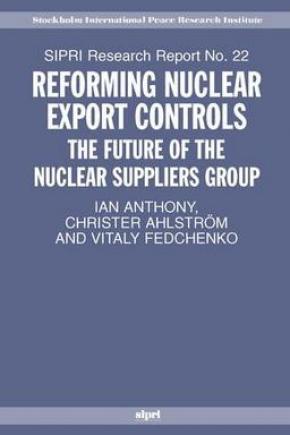Reforming Nuclear Export Controls: The Future of the Nuclear Suppliers Group

Reforming Nuclear Export Controls: The Future of the Nuclear Suppliers Group examines the structure and activities of the Nuclear Suppliers Group (NSG), a body of 45 states committed to applying effective controls on exports of an agreed set of nuclear materials and technologies. The diversion to military programmes of nuclear materials and technologies originally imported for peaceful purposes has played a key role in the known cases of nuclear proliferation. In all of these cases nuclear export controls have failed, and both the European Union and the G8 have since identified the need to strengthen them. Looking to the future, the report analyses the place of the NSG within the overall effort to prevent nuclear proliferation.
This report asks what kinds of nuclear activity are consistent with the obligations of states parties to the Non-Proliferation Treaty (NPT). What are the connections and tensions between the 'inalienable right' of non-nuclear weapon states party to the NPT to use nuclear materials and technology for peaceful purposes, and the rules and guidelines of the NSG, which are intended to block access to nuclear material and technologies for military use? The report considers how NSG decision making is potentially affected by the tendency to divide countries into categories of 'good' or 'bad' behaviour based on political criteria, rather than on the record of states under the nuclear non-proliferation regime. These pressing issues are examined via the specific cases of India and Iran.
Finally, Reforming Nuclear Export Controls discusses whether and to what extent other current efforts intended to prevent nuclear proliferation—the Proliferation Security Initiative and the activities of the International Atomic Energy Agency and the UN '1540' Committee—can supplement decision making on export control, or even supplant the role of the NSG.
About the authors
Dr Ian Anthony (United Kingdom) is the SIPRI Research Coordinator. His most recent publication for SIPRI is Reducing Threats at the Source: A European Perspective on Cooperative Threat Reduction, SIPRI Research Report no. 19 (2004). and, as co-editor, A Future Arms Control Agenda: Proceedings of Nobel Symposium 118, 1999 (2001). He is also editor of Russia and the Arms Trade (1998).
Dr Christer Ahlström (Sweden) is Associate Professor of International Law at Uppsala University and a career diplomat in the Swedish Foreign Service. He was Deputy Director of SIPRI from 2002 until 2005. Previously, he served as a Deputy Director in the Swedish Ministry for Foreign Affairs on issues related to disarmament and non-proliferation of weapons of mass destruction.
Vitaly Fedchenko (Russia) is a Researcher with the SIPRI Non-proliferation and Export Controls Project, with responsibility for nuclear security issues and the political, technological and educational dimensions of nuclear arms control and non-proliferation. He is the author or co-author of several publications on international non-proliferation and disarmament assistance, the international nuclear fuel cycle and Russian nuclear exports.
This book can be ordered from all good bookshops and online booksellers or directly from OUP
OUP in the UK:
http://www.oup.com/uk/catalogue/?ci=9780199290864 (paperback)
OUP in the USA:
http://www.us.oup.com/us/catalog/general/?view=usa&ci=9780199290857 (hardback) http://www.us.oup.com/us/catalog/general/?view=usa&ci=9780199290864 (paperback)


